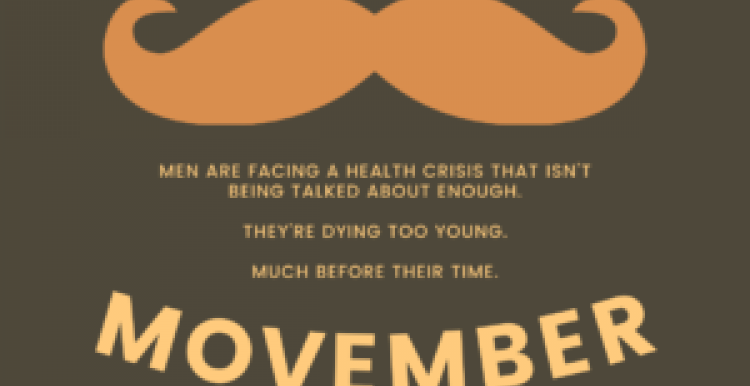Movember - Men's Health Awareness

Since 2003, Movember has funded more than 1,250 men’s health projects around the world, challenging the status quo, shaking up men’s health research and transforming the way health services reach and support men.
By 2030, the Movember movement aims to reduce the number of men dying prematurely by 25%.
Men are dying before their time, but we can help change this and save lives, as Movember funds groundbreaking health projects across mental health and suicide prevention, prostate cancer and testicular cancer – 1,250 projects so far.
Grow a Mo this Movember to raise funds and awareness for men’s health. Stop men dying too young.
Sign up at Movember.com - Choose to grow this Movember.
Start Growing - Start clean-shaven, then let your Mo take the spotlight and start conversations.
Make it Count - Ask friends and family to back your Mo by donating. Together, we can stop men dying too young.
Men's Mental Health
Men sometimes aren’t comfortable reaching out and opening up about life’s challenges – or they think they’ll be burdening their friends if they do.
If someone you care about seems to be going through a tough time, they might not talk about it even if they want to. The first step in looking out for them is reaching out.
You can’t fix someone else’s problems, but you can be there for them. Sometimes listening is the most helpful thing you can do. You won’t make things worse by asking someone how they’re doing. Keep in mind that it’s always worth preparing yourself before you start the conversation.
Prostate Cancer
The risk of developing prostate cancer increases with age, but that doesn’t mean it’s a disease that only affects old men. Prostate cancer is the second most common cancer in men worldwide. Men who are black, and men who have a family history (a brother or father with prostate cancer), are 2.5x more likely to get prostate cancer.
If you’re 50, you should be talking to your doctor about Prostate-Specific Antigen (PSA) testing. If you’re black, you need to start that conversation at 45. And if you have a brother or father with prostate cancer in their history, do it at 45.
Symptoms of Prostate Cancer
- A need to urinate frequently, especially at night
- Difficulty starting urination or holding back urine
- Weak or interrupted flow of urine
- Painful or burning urination
- Difficulty in having an erection
- Painful ejaculation
- Blood in urine or semen
- Frequent pain or stiffness in the lower back, hips, or upper thighs
Testicular Cancer
Testicular cancer is the most common type of cancer in young men. But when it’s diagnosed and treated early, there’s a high survival rate.
- There are different types of testicular cancer.
- More than 90% of testicular cancers start in the cells that make sperm (germ cells).
- The main types of germ cell cancers are seminomas and non-seminomas.
- Treatment decisions and chances of recovery depend on the kind of cancer and the type of cell it starts in.
Testicular cancer isn’t very common. It makes up only 1% of all male tumors. But it’s the most common cancer in males aged 15 to 39. Fortunately, the testicular cancer survival rate is pretty good with treatment — 95%
